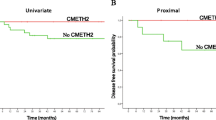Abstract
Background and Aims
Between 10 and 15% of all cases of colorectal cancer are the result of microsatellite instability (MSI) in the genetic pathway due to an alteration in the DNA repair genes. Tumors with high MSI are characterized by a better prognosis. The BRAF oncogene has been linked to the MSI pathway in tumorogenesis. The objective of this study was to determine whether alterations in BRAF are related to MSI and whether they can result in differences in survival rates.
Methods
The study cohort comprised 351 patients diagnosed with sporadic colorectal cancer. MSI was determined in accordance with the National Cancer Institute’s (NCI) recommendations by means of PCR and sequence analyses. Mutational analysis of the BRAF gene was performed by real-time PCR and subsequent sequencing of the altered samples. The methylation pattern of the hMLH1 gene was determined using methylation-specific PCR analyses of bisulfite-treated DNA and the results confirmed by sequencing.
Results
Of the patients tested, 6.9% showed high MSI and 3.7% showed a BRAF gene mutation. hMLH1 methylation was observed in 67.2% of the patients with MSI and/or the BRAF alteration. The BRAF mutation was related to the MSI genetic pathway (P < 0.0001) and with hMLH1 methylation. In the analysis of overall survival only MSI had an independent prognostic value for the risk of death. Patients with the BRAF mutation showed a higher risk of death, although this association was found not to be statistically significant.
Conclusions
There is a subgroup of carcinomas which develop via the MSI pathway that carry an alteration of the BRAF gene. This alteration confers a poorer outcome on these patients within the total group of patients with MSI who have a better prognosis. This hypothesis should be further investigated in a larger study population due to the low incidence of BRAF mutations in colorectal cancer.
Similar content being viewed by others
References
Fearon ER, Vogelstein B. A genetic model for colorectal tumorigenesis. Cell 1990;61:759–67
Thibodeau SN, Bren G, Schaid D. Microsatellite instability in cancer of the proximal colon. Science 1993;260:816–19
Gryfe R, Kim H, Hsieh ET, Aronson MD, Holowaty EJ, Bull SB, Redston M, Gallinger S. Tumor microsatellite instability and clinical outcome in young patients with colorectal cancer. N Engl J Med 2000;342:69–77
Wright CM, Dent OF, Barker M, Newland RC, Chapuis PH, Bokey RL, Young JP, Leggett BA, Jess JR, Macdonald GA. Prognostic significance of extensive microsatellite instability in sporadic clinicopathological stage C colorectal cancer. Br J Cancer 2000;87:1197–202
Samowitz WS, Sweeney C, Herrick J, Albertsen H, Levin TR, Murtaugh MA, Wolff RK, Slattery ML. Poor survival associated with the BRAF V600E mutation in microsatellite-stable colon cancers. Cancer Res 2005;65:6063–9
Koinuma K, Shitoh K, Miyakura Y, Furukawa T, Yamashita Y, Ota J, Ohki R, Choi YL, Wada T, Konishi F, Nagai H, Mano H. Mutations of BRAF are associated with extensive hMLH1 promoter methylation in sporadic colorectal carcinomas. Int J Cancer 2004;108:237–242
Rajagopalan H, Bardelli A, Lengauer C, Kinzler KW, Vogelstein B, Velculescu VE. Tumorigenesis: RAF/RAS oncogenes and mismatch-repair status. Nature 2002;418:934
Miyakura Y, Sugano K, Konishi F, Fukayama N, Igarashi S, Kotake K, Matsui T, Koyama Y, Maekawa M, Nagai H. Methylation profile of the MLH1 promoter region and their relationship to colorectal carcinogenesis. Genes Chromosomes Cancer 2003;36:17–25
Boland CR, Thibodeau SN, Hamilton SR, Sidransky D, Eshleman JR, Burt RW, Meltzer SJ, Rodriguez-Bigas MA, Fodde R, Ranzani GN, Srivastava S. A National Cancer Institute Workshop on microsatellite instability for cancer detection and familial predisposition: development of international criteria for the determination of microsatellite instability in colorectal cancer. Cancer 1998;58:5248–57
Miyakura Y, Sugano K, Konishi F, Ichikawa A, Maekawa M, Shitoh K, Igarashi S, Kotake K, Koyama Y, Nagai H. Extensive methylation of hMLH1 promoter region predominates in proximal colon cancer with microsatellite instability. Gastroenterology 2001;121:1300–9
Domingo E, Espín E, Armengol M, Oliveira C, Pinto M, Duval A, Brennetot C, Seruca R, Hamelin R, Yamamoto H, Schwartz S. Activated BRAF targets proximal colon tumors with mismatch repair deficiency and MLH1 inactivation. Genes Chromosomes Cancer 2004;39:138–142
Wang L, Cunningham JM, Winters JL, Guenther JC, French AJ, Boardman LA, Burgart LJ, McDonnell SK, Schaid DJ, Thibodeau SN. BRAF mutations in colon cancer are not likely attributable to defective DNA mismatch repair. Cancer Res 2003;63:5209–12
Kazama Y, Watanabe T, Kanazawa T, Tada T, Tanaka J, Nagawa H. Mucinous carcinomas of the colon and rectum show higher rates of microsatellite instability and lower rates of chromosomal instability: a study matched for classification and tumor location. Cancer 2005;103:2023–9
Ward RL, Cheong K, Ku S, Meagher A, O´ Connor T, Hawkins NJ. Adverse prognostic effect of methylation in colorectal cancer is reversed by microsatellite instability. J Clin Oncol 2003;21:3729–36
Author information
Authors and Affiliations
Corresponding author
Additional information
Grant support:
This study was supported by grant no. PI030514 from the “Fondo de Investigaciones Sanitarias”, Spain
Rights and permissions
About this article
Cite this article
Maestro, M.L., Vidaurreta, M., Sanz-Casla, M.T. et al. Role of the BRAF Mutations in the Microsatellite Instability Genetic Pathway in Sporadic Colorectal Cancer. Ann Surg Oncol 14, 1229–1236 (2007). https://doi.org/10.1245/s10434-006-9111-z
Received:
Revised:
Accepted:
Published:
Issue Date:
DOI: https://doi.org/10.1245/s10434-006-9111-z




